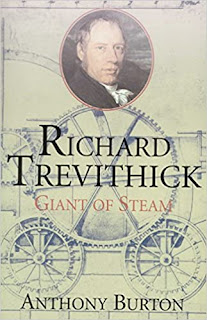Cornwall is known for its wild, craggy shorelines, its history of smuggling, as the location of Daphne du Maruier’s Jamaica Inn and of course Cornish pasties. It’s also known for its landscape which is rich in metallic mineral deposits, particularly tin and copper. In Catherine’s Passion, Book 3 of The Ladies of Harrington House, the hero is in the process of reviving an old tin mine that had flooded. Therefore this blog post will focus on tin mining although copper mining also played a great role in Cornwall’s history.
Mining activity in Cornwall
dates back to the Bronze age, where tin was taken out of river valleys or by
open cast mining. It was obviously a valuable commodity for there is evidence
of trade between Cornwall and northern Europe and the eastern Mediterranean. It
was also of great value to Britain as Cornwall (and Devon) were the only local
sources of tin.
By medieval times, Cornish
tinners were renowned. Because of the valuable resource they provided, they
were subject to special taxes, with unique privileges granted by Royal Charter.
Cornish stannaries, or the areas where tin was mined, had their own laws and
own parliament. These stannaries were organized
to manage the collection of tin coinage, which was the duty payable on the tin
mined in that particular area. In my story, the tin ore will be sent to Truro, one
of Cornwall’s ‘stannary’ towns. Locally mined tin (and copper) was brought
there twice a year for assaying and stamping before shipment. Tinners had
special rights, even to the extent of ignoring some of the laws of the land.
As the surface resources
faded, tinners dug deeper to follow the lodes. The tin lodes were found in near
vertical sheets in the rock. Hard rock mining and draining water from shafts produced
skills and machinery that eventually were exported around the world. For
example, Cornishman Richard Trevithick invented the Cornish high pressure steam
engine, using them to pump water from the mines, lift ore to the surface and
crush ore. Once numbering around 3000, Cornish beam engine houses are truly
iconic landmarks. (This book about Richard Trevithick and his inventions is available on Amazon.)
Around 25 percent of the
Cornish population worked in mines, from the mineral lords and investors to
working families. Even the women were involved as bal maidens (bal is Cornish
for mine) working “at grass” (above ground), crushing ore into fragments by
hammer on anvil with only big hats called gooks to protect them from bad
weather and rock debris. The men worked underground in hot dusty tunnels, running
the constant risks of drowning, rock falls, and explosions.
The courage and skills of
Cornish hard rock miners provided many a miner with a good living abroad, from
the California Gold Rush to Australia, South Africa and beyond. A local who
made this journey became known in Cornwall as a Cousin Jack. One theory that
these men were called Cousin Jack is because they were always asking for a job
for their cousin “Jack” back home. Another theory is that it’s because miners
always used to greet each other by cousin and Jack was the most popular name in
Cornwall at that time.
It's always an interesting challenge as a writer to include historical detail into works of fiction. I find any research I do always gives me story ideas! Read about Julian Fitzgerald and his tin mine in Catherine's Passion, coming soon from BWL Publishing. 😀





























.jpg)

.jpg)




